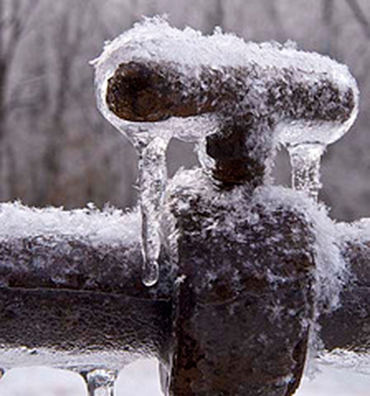Preventing Frozen Pipes: How to Keep your Home’s Pipes from Freezing

On a blistering cold winter Sunday, a family of four in Nashville went to Titan’s football game. When they arrived home six hours later, they were horrified to find that their house was filled with water, completely destroying all of their flooring, most of their furniture, and everything lying on the floor,including their Christmas presents! The culprit? The feeder line for their refrigerator’s ice maker, which ran through their unheated attic. Who would have thought that such a small hose could cause that much damage?
Don’t let this happen to you. With freezing weather in the forecast, take steps now to prevent frozen pipes. Preventative measures now can head off a multitude of problems.
Preventing Frozen Pipes Plumbers’ Checklist:
1. Examine all pipes supplying water to your home.
a. Wherever water is found, look for the piping that supplies it. This includes sinks, toilets, and any built-in water supply like ice makers or fish tanks.
b. Note any pipes in the attic, basement, garage, or crawl space. Pipes in the basement will probably be fine, as most basements retain an even temperature year round. However, pipes in unheated areas are very vulnerable to freezing.
c. Also note any piping that is located in an exterior wall. Make sure the wall is well insulated.
2. Insulate any exposed pipe that is in danger of freezing.
a. This could include a foam sleeve, “heat tape” or “heat cable”, all available from your home improvement or hardware store.
b. Even wrapping pipes with ¼” of newspaper, sealed with duct tape will help keep exposed pipes safe.
c. If pipes are located inside a wall, check for water damage, mold, or dampness. This could indicate that a pipe has burst in the past, and that the wall is inadequately insulated.
3. Make sure you and every member of your family knows where your water shutoff valve for the whole house is located. If a pipe bursts, quickly shutting off the water supply will cause the damage to be minimal.
4. Drain the water from swimming pools, hot tubs, water sprinkler systems, or outdoor kitchens. Freezing water exerts an enormous amount of pressure on reservoirs, causing them to crack. Do not use antifreeze in outdoor tanks and pipes. This is harmful to the environment, and is dangerous for pets, wild animals, and even humans if it leaks into the yard.
5. Drain and store yard hoses. Undrained hoses will crack when frozen, and having an attached hose allows freezing water to enter your interior pipes.
6. Cover all outside faucets with insulating products specifically designed for their protection. Even wrapping them with an old towel and duct tape is better than leaving them exposed.
7. For extra protection, close off the water supply to the outside faucets using an interior valve. Leave the faucet open to allow any water left in the pipe to expand as it freezes.
8. Keep garage doors closed in the winter to protect pipes located inside them.
9. On very cold nights, or if you plan to be away from home for an extended period, leave cabinet doors open under all sinks to allow the warmer air to reach the pipes inside.
10. Leave your heating on, even if you plan to be away for a long trip. Do not let the room temperature get below 50 degrees – knowing that it can get even colder in closets, cabinets, and rooms that do not have heating vents.
Taking steps now, can help to keep your home safe in the coldest weather. If you need a local plumber or simply have a question, please call Fix It All Plumbing, LLC 615-568-5051.
Blog by Kevin Sipes,
Master Plumber
Nashville, TN
